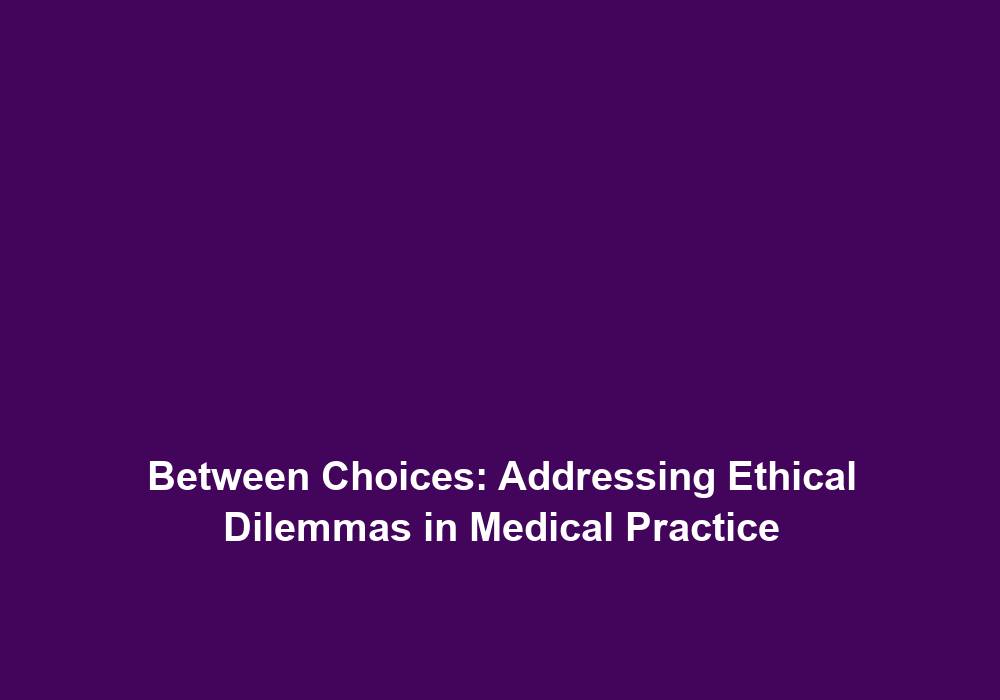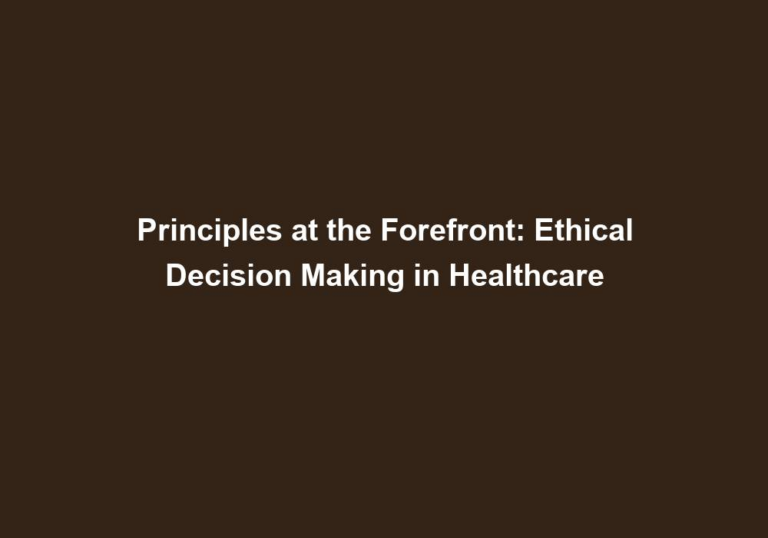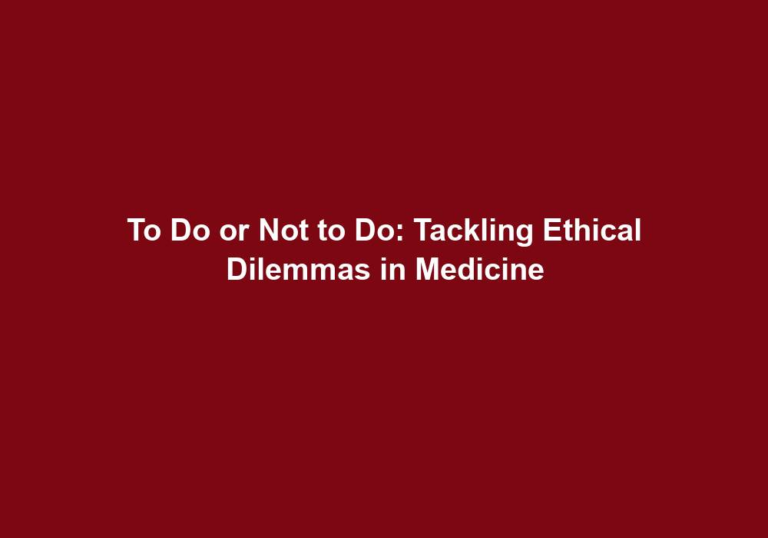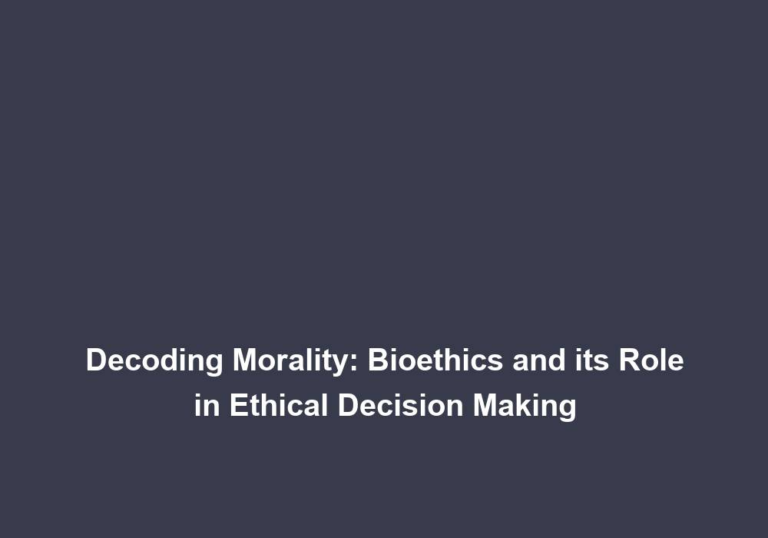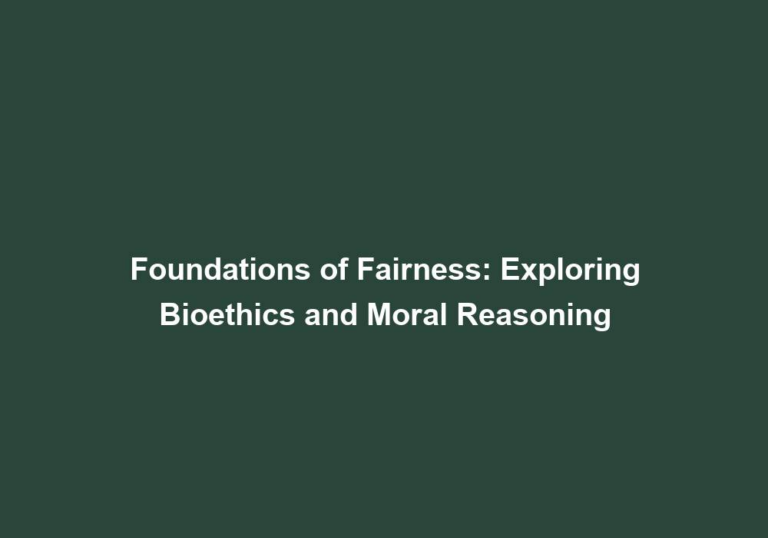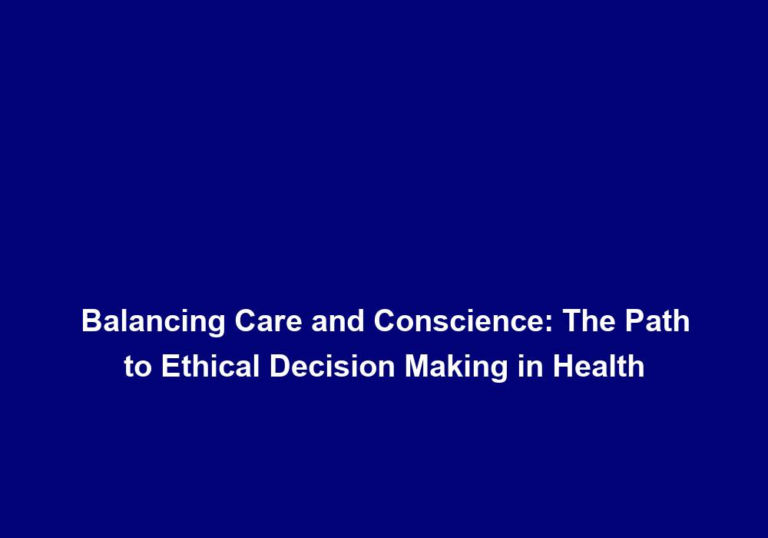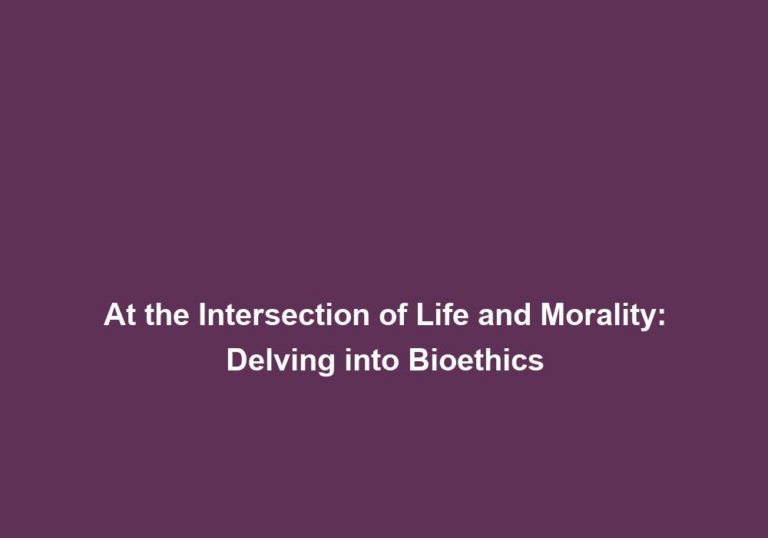Between Choices: Addressing Ethical Dilemmas in Medical Practice
In the field of medicine, practitioners often encounter various ethical dilemmas that require careful consideration and decision-making. These ethical dilemmas arise when healthcare professionals face situations where they must choose between two morally conflicting options. Addressing these dilemmas requires a comprehensive understanding of ethical principles, effective communication, and critical thinking. In this article, we will delve into the intricacies of ethical decision-making in medical practice and explore strategies to navigate through these challenging situations.
Understanding Ethical Dilemmas
Ethical dilemmas in medical practice can be complex and multifaceted. They may arise due to conflicts between different ethical principles, legal obligations, cultural beliefs, or personal values. These dilemmas can occur in various healthcare settings, including hospitals, clinics, research institutions, and even during interactions with patients and their families.
It is important to acknowledge that ethical dilemmas do not always have a clear-cut solution. They require a nuanced approach, taking into account all relevant factors and considering the potential consequences of each available option. Moreover, ethical dilemmas often involve ethical gray areas, where there is no universally accepted answer. Healthcare professionals must navigate these complexities with utmost care and professionalism.
Ethical Principles in Medical Practice
To navigate through ethical dilemmas, healthcare professionals should familiarize themselves with the fundamental ethical principles that guide medical practice. These principles provide a framework for ethical decision-making and help ensure that patient-centered care is upheld. Let’s explore each principle in more detail:
-
Autonomy: Respecting the patient’s right to make decisions about their own healthcare. This principle emphasizes the importance of informed consent and the patient’s ability to exercise their autonomy in determining their treatment options.
-
Beneficence: Promoting the well-being and welfare of the patient. Healthcare professionals must strive to act in the best interest of their patients, ensuring that their actions result in positive outcomes and improve the patient’s overall health.
-
Nonmaleficence: Avoiding harm to the patient and minimizing potential risks. This principle requires healthcare professionals to carefully assess the potential risks and benefits of any intervention, ensuring that they do not cause unnecessary harm to the patient.
-
Justice: Ensuring fairness and equality in the distribution of healthcare resources. Healthcare professionals must consider the equitable distribution of resources and strive to provide equal access to quality care for all patients, regardless of their background or socioeconomic status.
-
Veracity: Being truthful and honest in all interactions with patients and colleagues. This principle emphasizes the importance of open and transparent communication, ensuring that patients are fully informed about their condition, treatment options, and potential risks.
-
Confidentiality: Safeguarding patient information and maintaining privacy. Healthcare professionals must respect the confidentiality of patient information, ensuring that it is not disclosed without the patient’s consent, except when required by law or for the benefit of the patient.
By integrating these principles into their decision-making process, healthcare professionals can balance competing values and make informed choices that align with ethical standards. These principles provide a moral compass for navigating the complexities of ethical dilemmas in medical practice.
Strategies for Addressing Ethical Dilemmas
When faced with an ethical dilemma, healthcare professionals can follow certain strategies to navigate these challenging situations effectively. Here are some strategies to consider:
1. Identify the Ethical Dilemma
The first step in addressing an ethical dilemma is to recognize its presence. Analyze the situation and identify the conflicting values or principles involved. This awareness will help guide the decision-making process and provide a framework for ethical analysis. It is important to consider the context and the potential implications of each option.
2. Gather Relevant Information
To make an informed decision, it is crucial to gather all relevant information and facts about the situation at hand. Consult medical literature, ethical guidelines, institutional policies, and seek input from colleagues and experts in the field. A comprehensive understanding of the context and potential implications of each option is essential. Consider the available evidence, research findings, and expert opinions to guide your decision-making process.
3. Assess the Options
Once all the necessary information has been gathered, evaluate the available options and consider their potential benefits, risks, and consequences. Assess the impact on the patient, their family, and the broader healthcare system. Use critical thinking skills to weigh the ethical principles and values involved. Consider the long-term consequences of each option and strive to choose the course of action that aligns with the principles of autonomy, beneficence, nonmaleficence, justice, veracity, and confidentiality.
4. Communicate and Collaborate
Ethical dilemmas often benefit from collaborative decision-making. Engage in open, honest, and respectful communication with the patient, their family, and other healthcare professionals involved. Discuss the available options, clarify doubts, and address concerns. Collaboration fosters a shared understanding and helps build consensus on the best course of action. Ensure that all stakeholders are involved in the decision-making process, respecting the autonomy and input of the patient.
5. Document the Decision-Making Process
To ensure transparency and accountability, it is essential to document the ethical decision-making process. This documentation should include the factors considered, the options evaluated, and the reasons behind the final decision. Proper documentation promotes transparency, aids in future reference, and can be valuable for educational purposes. It also serves as a record of the decision-making process, which may be required for legal or ethical review.
6. Seek Ethical Consultation
In particularly complex or challenging cases, healthcare professionals may seek ethical consultation from institutional ethics committees, bioethicists, or other trusted experts. Ethical consultation provides an opportunity to gain insights from different perspectives and receive guidance on navigating through intricate ethical dilemmas. This external input can help healthcare professionals make well-informed decisions that align with ethical standards and professional norms.
Conclusion
Addressing ethical dilemmas in medical practice requires a comprehensive understanding of ethical principles, effective communication, critical thinking, and a commitment to providing patient-centered care. By recognizing the complexities inherent in these dilemmas and employing the strategies outlined above, healthcare professionals can make well-informed, ethical decisions that uphold the highest standards of care. Ultimately, the goal is to ensure that patient autonomy, beneficence, nonmaleficence, justice, veracity, and confidentiality are upheld while navigating the challenging landscape of medical ethical dilemmas.

